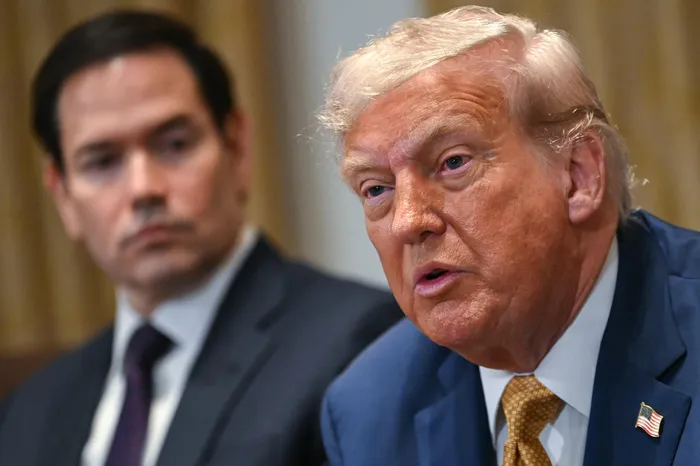
US President Donald Trump speaks as Secretary of State Marco Rubio looks on during a cabinet meeting in the Cabinet Room of the White House in Washington, DC, on July 8, 2025.
Image: ANDREW CABALLERO-REYNOLDS / AFP
US PRESIDENT Donald Trump's motivation for threatening the BRICS bloc, including imposing steep tariffs on its members, is rooted in his desire to maintain US dominance in the global economy.
That is according to at least one international relations expert after Trump announced a 30% tariff on South African goods and produce exported into the US from 01 August.
At a recent BRICS summit in Rio de Janeiro, the 11-nation bloc, which also includes Brazil, Russia, India, and China, criticised Trump's imposed tariffs.
In response, Trump accused the group of "anti-Americanism" and pledged an additional 10 percent tariff on their goods.
International relations expert Dr. Noluthando Phungula said: "As the Head of State and a representative of the unipolar superpower bloc, Trump is reasonably threatened."
"The BRICS expansion and growth speak to a clearer call from the Global South towards multilateralism. This inadvertently challenges Western dominance and calls for a reformation of international power structures,” Phungula said.
She said South Africa should stand firm in the face of US pressure, particularly when considering the leveraging strategies used by Trump.
President Cyril Ramaphosa condemned Trump's threat, saying efforts to "punish" the bloc were disappointing.
"BRICS does not seek to compete with any other power. The bloc advocates for the emergence of various centres of power in the world," he said.
He said the BRICS bloc's goal was to promote cooperation and advance humanity's interests, not to compete with any particular country.
"There should never be vengeance. There should never be retribution against countries that are seeking to cooperate and to advance the interests of humanity," he said.
Cosatu spokesperson Matthew Parks said it was deeply concerned about the 30% tariff because it will have a devastating impact on the economy that has been languishing at 1% growth rate and a shockingly high unemployment rate of 43.1%.
He said sectors that would be hard hit included the automotive, agriculture, clothing, chemical and jewellery industries
"Worryingly, the impact of the impending tariff is already being felt in the Eastern Cape with 900 jobs on the line at Good Year SA and Mercedes Benz 'temporarily' shutting down its vehicle production,” he said.
Cape Times
Related Topics: